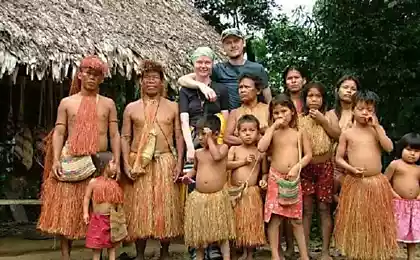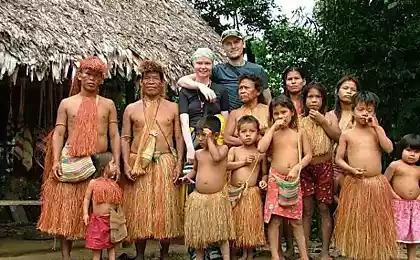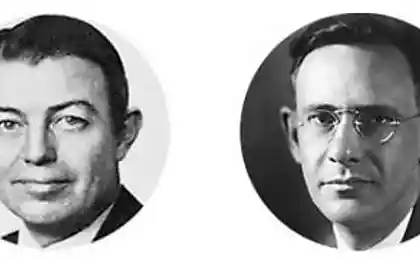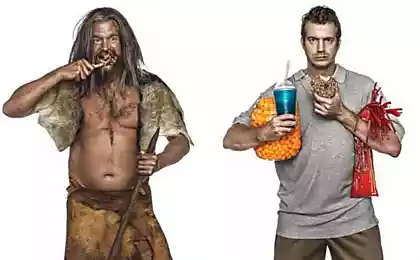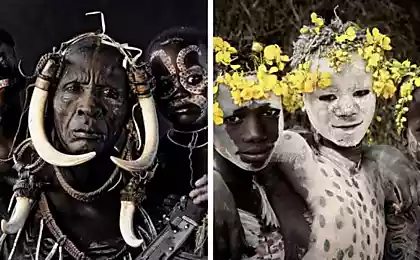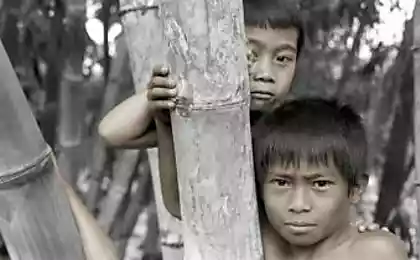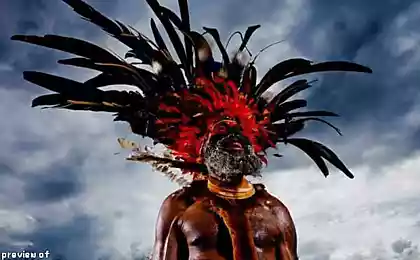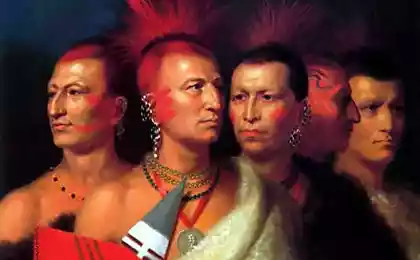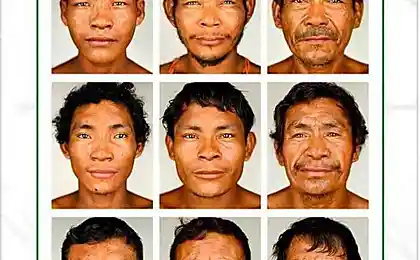1200
Feasts
Tribe feasts - it is a small nation that lives in Brazil. Their unique culture by modern standards, a hunter-gatherer attracts attention a huge number of scientists. Traveler and explorer Daniel Everett spent eight years with the tribe and told in the colors of their life and culture.
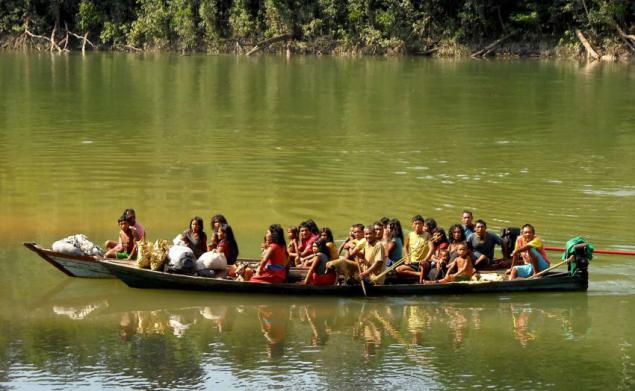
They do not know how to count - even to one. They live here and now and make plans for the future. Past them is irrelevant. They do not know any hours or days, or in the morning or night, and even more so, of the daily routine. They eat when hungry and sleep only fitfully for half an hour, considering that long sleep takes power.
He is unknown private property and do not care for all that is of value to the modern civilized man. They do not know anxiety, fears and prejudices that plagued 99 percent of the world's population.
They call themselves the "right people", while the rest of them - the "brains on one side." They are totally satisfied with their lives. This is a very happy people - the people of tribal feasts.
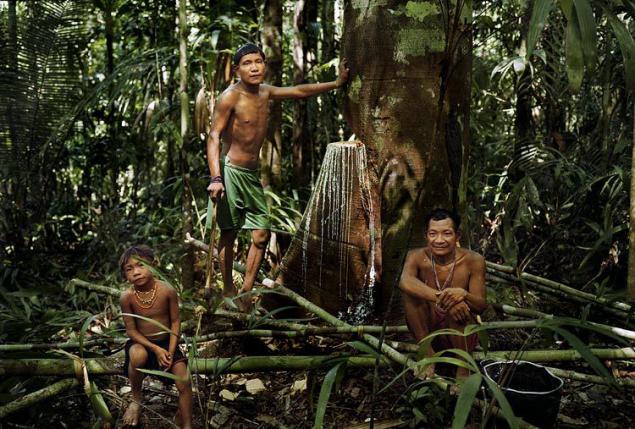
We white people have an amazing "talent" - brazenly invade supposedly undeveloped territory and to impose its own rules, customs and religion. World history of colonization - a clear confirmation. Still, one day, somewhere on the edge of the earth, discovered a tribe of people who have not succumbed to the missionary and educational activities, as this activity seemed to them worthless and utterly unconvincing.
American preacher and part-ethnographer and linguist Daniel Everett in 1977, arrived in the Amazon jungle to carry the word of God. His goal was to talk about the Bible to those who did not know about it - to instruct on the right path and godless savages. Instead, the missionary met the people living in such harmony with the surrounding world, which they themselves have paid him in his faith, and not vice versa.
Portuguese gold prospectors first discovered 300 years ago, the tribe feasts living in four villages in the area of the river Este, a tributary of the Amazon. And thanks to an American who has dedicated years of his life studying their way of life and language, it has gained worldwide fame.
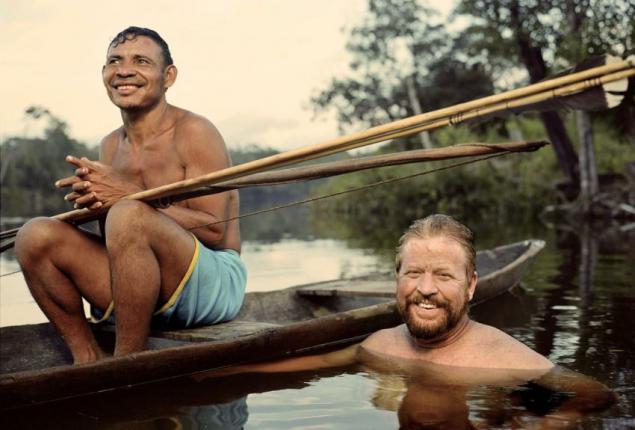
"Quality of life was in many ways better than most religious people I knew. I found the world of the Indians is very inspiring and a good "- says Everett.
But not just a philosophy of life feasts shaken the value system of the young scientist. Aboriginal language was so different from all other known language groups that literally turned the traditional idea of the fundamentals of linguistics. "Their language is not as difficult as it is unique. Nothing like the world is no longer met. " Compared with the rest of the language of these people it seems "more than strange" - there are only seven consonants and three vowels. But at banquets can talk, sing, whistle and even communicate with birds.
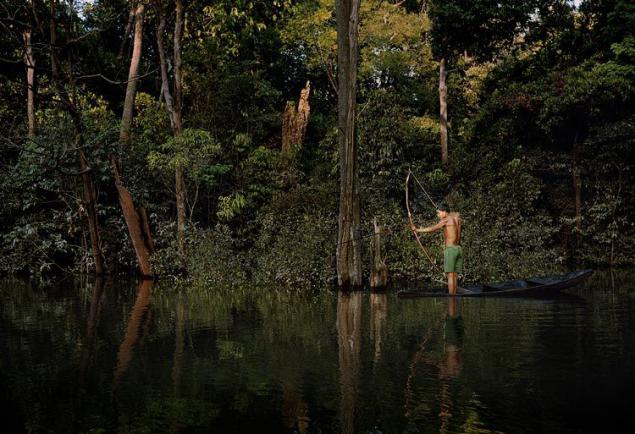
The story of Jesus Christ made no impression on the Indian feasts. The idea that a missionary really believe the story about the man whom he had never seen, to show them the height of absurdity.
Dan Everett, "I was only 25. Then I was fervently religious man. He was ready to die for their faith. He was ready to do everything that it requires. Then I understood that other people impose their beliefs - it's the same colonization, colonization is only at the level of beliefs and ideas. I have come to tell them about God and salvation to those people could go to heaven and not to hell. But I met special people, for which most of the things that were important to me, did not matter. They could not understand why I have decided that I have the right to tell them how to live ».
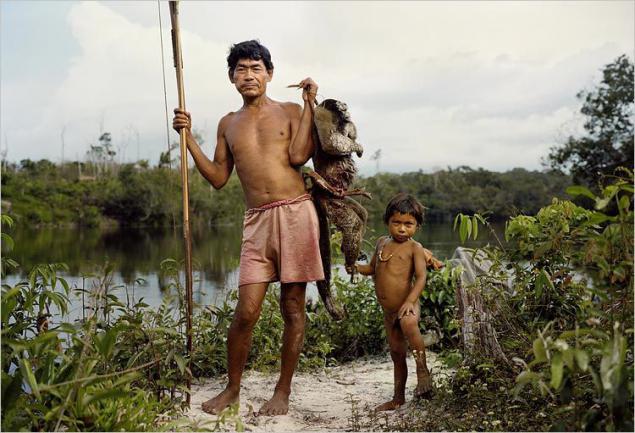

One of the books that Everett wrote under the impression of "incredible and very different Indians" called: «Do not sleep there are snakes!», Which literally translates: "Do not sleep, snakes everywhere!" And indeed, among the feasts are not accepted sleep for a long time - only 20-30 minutes, and only when necessary. They are convinced that a long sleep can change a person, and if a lot of sleep, there is a risk of losing yourself, becoming quite different. My daily routine they do not like the fact the regular eight-hour sleep and they just do not need. For this reason, they do not sleep at night, and just doze a little bit where they overtake fatigue. To not sleep, they rubbed their eyelids juice of a tropical plant.
By observing changes in your body associated with the stages of maturation and aging, feasts believe that the reason the dream. Gradually changing every Indian takes a new name - this happens on average once every six to eight years. For each age they have their names so that, knowing the name, you can always say about someone in question - about the child, adolescent, adult, or an old man.
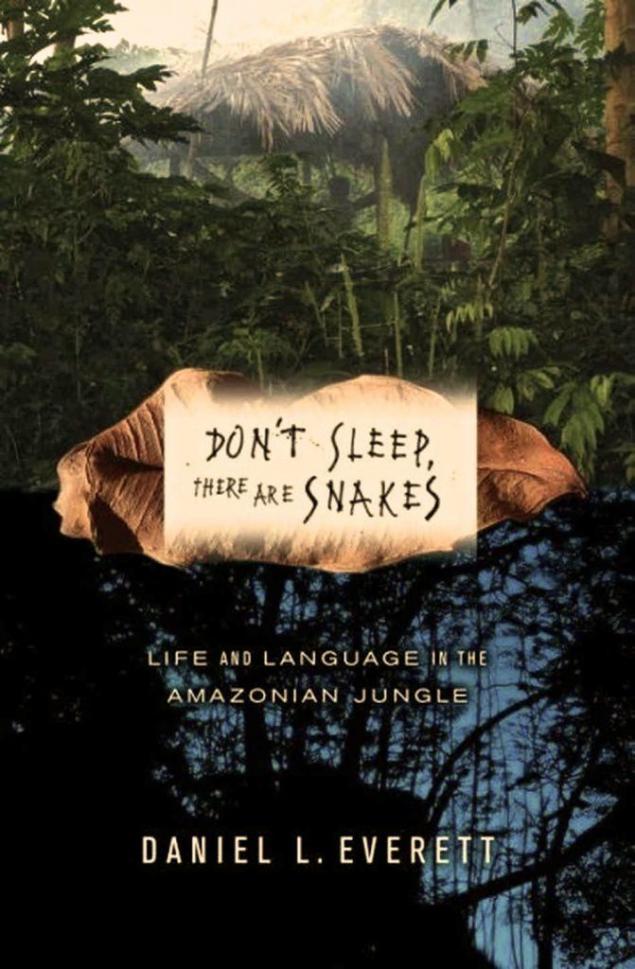
Everett 25 years of missionary work is in no way influenced the beliefs feasts. But the scientist, in turn, once and for all zayazal with religion and even more immersed in the scientific activities, becoming a professor of linguistics. Comprehending Aboriginal worlds, Daniel and then faced with things that are hard to fit into his head. One of these phenomena - the absolute absence of numerals and counting. The Indians of the tribe using only two corresponding words: "several" and "a lot».
"Feasts do not use the number because I do not need them - they do very well without it. One day I asked, "So, mothers feasts do not know how many children they have?" I replied, "They do not know the exact number of their children, but they know their names and faces. They do not need to know the number of children to recognize them and love ».
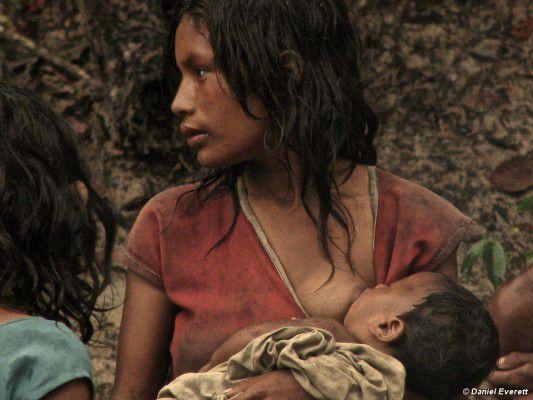
Even more weird seems no separate words for colors. It's hard to believe, but the natives living in the middle filled with bright colors of the tropical jungle, there are only two words denoting the color of the world - the "light" and "dark." At the same time, all the Pirahã successfully pass the test for color separation, distinguishing silhouettes of birds and animals in mixed colored smears.
Unlike its neighbors from other tribes, the folk does not create decorative patterns on their bodies, indicating a complete absence of art. There is no form of feasts past and future tenses. Myths and legends here as well not exist - the collective memory is built only on personal experience of the oldest of the living members of the tribe. At the same time, each of them has a truly encyclopedic knowledge of thousands of plants, insects and animals - remembering the names of all the properties and features.
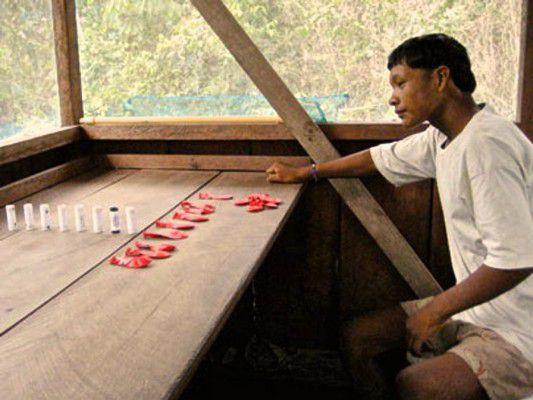
Another phenomenon of these extraordinary citizens deaf Brazilian jungle - complete lack of food storage ideas. Everything that is produced from hunting or fishing immediately eaten. A new portion of them are sent only as much hungry. If the outing for with food does not work, they are taking it philosophically - say, often there are also bad as a lot of sleep. The thought of food for future use blanks they seem so absurd as tales of white-skinned people of the one God.
Feasts eat no more than twice a day, and sometimes even rarer. Watching as Everett with the family was eating his regular lunch, lunch or dinner, banquets sincerely wondered "How can you eat so much? You're so die! »
On private property - it's not the same as humans. The majority of things - total. Is that uncomplicated clothing and personal weapons at everyone. However, if the person does not use this or that subject, so he does not need it. And therefore such a thing, you can easily borrow. If this fact upset the former owner, he will return it. It should also be noted that Piraha children have toys that however, does not prevent them from playing with each other, plants, dogs and forest spirits.
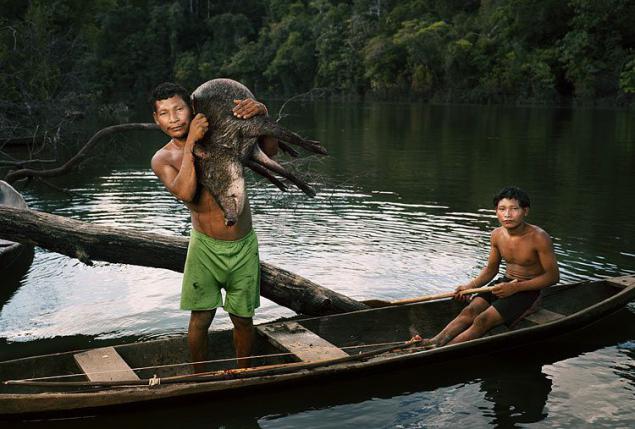
If you ask to find people on our Planet, free from any prejudice, then there feasts in the first place. No tortured joy, no false politeness, no "thank you", "excuse me" and "please." Why is it all when feasts, and so fond of each other without any silly formalities. Moreover, they never for a moment doubt that not only the tribesmen, but other people are always glad to see them. Feelings of shame, resentment, guilt or regret them as alien. Kakda right to do what he wants. Nobody nobody educates and teaches. It is inconceivable that one of them had stolen or killed.
"You will not find at feasts chronic fatigue syndrome. You do not encounter here with the suicide. The idea of suicide is contrary to their nature. I've never seen them anything even remotely resembling a psychiatric disorder that we associate with depression or melancholy. They just live in the present day, and they are happy. They sing at night. It's just a phenomenal degree of satisfaction - without psychotropic drugs and antidepressants "- says Everett, Pirahã has devoted more than 30 years of his life.
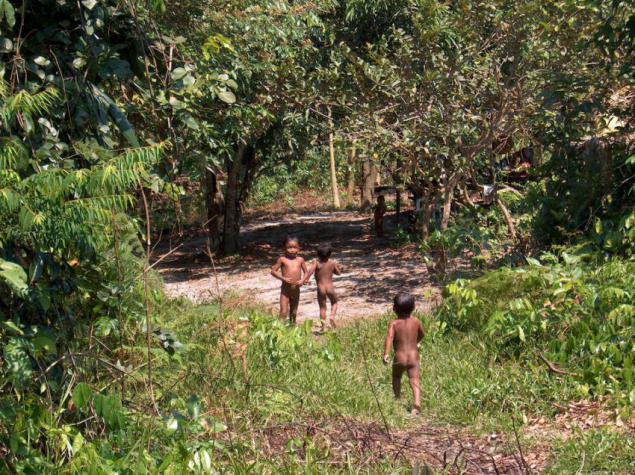
Relations with the world of children's jungle dreams also fall outside the scope of the usual for us. "They have a completely different concept of objective and subjective. Even when they have dreams, they do not separate them from the real world. The experiences in the dream, it is considered as important as the experience gained during wakefulness. Thus, if I dreamed that I was walking on the moon, then to their point of view, I really made this trip, "- says Dan.
Feasts see themselves as an integral part of nature - the children of the forest. For them, the forest - a complex living organism, in relation to which they have a genuine awe and sometimes even fear. The forest is full of strange and inexplicable things that they do not try to guess. And yet there lives a whole lot of mysterious spirits. Feasts believe that after death is sure to swell their ranks - then that they will get all the answers. And while there is no sense to bother with any nonsense.
Everett repeatedly watched as his fellow Indians are extremely lively, loud communicate with unseen spirits - as if it were ordinary people. Asked why a scientist does not see anything like that, every time he received a peremptory answer - they say, that's hard to understand - the spirits come not to him but to the feasts.
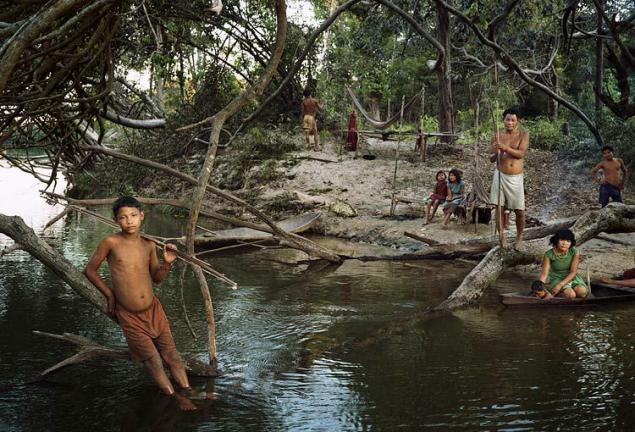
Contrary to the fears of Daniel associated with the possible disappearance of the tribe due to a collision with the larger world, the number of banquets in our days has increased from 300 to 700 people. Being in the four days' journey on the river, the tribe and now lives quite apart. There are still almost do not build houses and cultivate the soil for your needs, relying on nature. Clothing - the only concession to modern life feasts. They are extremely reluctant to accept the blessings of civilization. "They agree to only accept certain gifts. They need the fabric, tools, machetes, aluminum cookware, thread, matches, sometimes - flashlights and batteries, hooks and fishing line. They never ask for anything major - just small things, "- says Dan, thoroughly studied the habits and preferences of their unusual friends.
"I think that they are happy because they do not worry about the past and the future. They feel able to take care of your needs today. They do not seek the things that I do not possess. If I have something to give to them - good. If not - well, too. Unlike us, they are not materialists. They appreciate the opportunity to travel quickly and easily. I have never and nowhere (even among the other Indians of the Amazon) have not seen so calm attitude to material objects ».
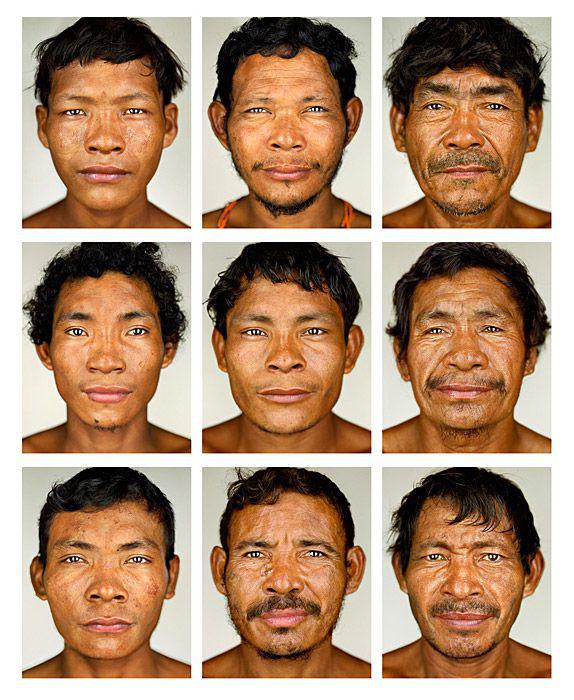
As you know, there is nothing that does not change the consciousness and inner peace as travel. And the farther from the house manages to get, the faster and more powerful the effect. Going beyond the familiar and the familiar world can be the most powerful, bright and unforgettable experience in my life. It is necessary to leave the comfort zone to see what he had not seen before, and know that what before had no idea.
"I often drew parallels between the Pirahã and worldview of Zen" - continues to Everett. "As for the Bible, I realized that for a long time was a hypocrite, because he is not fully believed in what he was saying. The man - a much more complex being than Scripture says, and religion does not make us better or happier. I am currently working on a book called "The Wisdom of The Travelers" - how important and useful lessons can we get from people who are very different from ourselves. And the more these differences, the more we can learn. None of the library you will not get such a valuable experience ».
It is unlikely that someone on this planet exists a precise definition of what happiness is. Perhaps happiness - a life without regret or fear of the future. People megacities difficult to understand how all this is possible. But the natives of the tribe feasts living "here and now", in other words just do not know how. What they do not see themselves, they do not exist. Such people do not need God. "We do not need heaven, we need that on the ground," - say the happiest people in the world - the people, with the people that never goes smile - Indian feasts.
Today, in the great world only three people speak the language Pirahã - Everett, his ex-wife and missionary who was the forerunner of Daniel in the lost jungles of the Amazon.
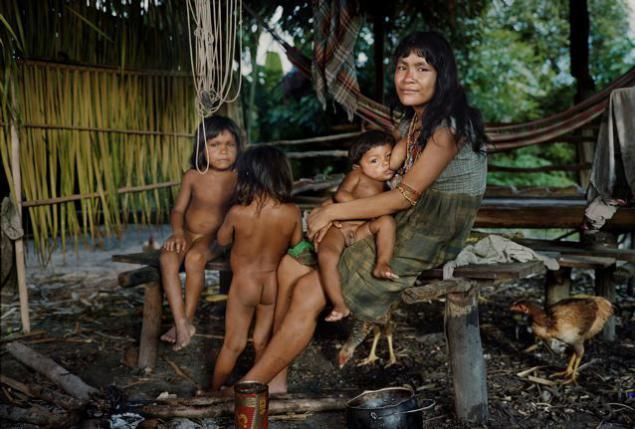
Source: i-am-mzungu.livejournal.com

They do not know how to count - even to one. They live here and now and make plans for the future. Past them is irrelevant. They do not know any hours or days, or in the morning or night, and even more so, of the daily routine. They eat when hungry and sleep only fitfully for half an hour, considering that long sleep takes power.
He is unknown private property and do not care for all that is of value to the modern civilized man. They do not know anxiety, fears and prejudices that plagued 99 percent of the world's population.
They call themselves the "right people", while the rest of them - the "brains on one side." They are totally satisfied with their lives. This is a very happy people - the people of tribal feasts.

We white people have an amazing "talent" - brazenly invade supposedly undeveloped territory and to impose its own rules, customs and religion. World history of colonization - a clear confirmation. Still, one day, somewhere on the edge of the earth, discovered a tribe of people who have not succumbed to the missionary and educational activities, as this activity seemed to them worthless and utterly unconvincing.
American preacher and part-ethnographer and linguist Daniel Everett in 1977, arrived in the Amazon jungle to carry the word of God. His goal was to talk about the Bible to those who did not know about it - to instruct on the right path and godless savages. Instead, the missionary met the people living in such harmony with the surrounding world, which they themselves have paid him in his faith, and not vice versa.
Portuguese gold prospectors first discovered 300 years ago, the tribe feasts living in four villages in the area of the river Este, a tributary of the Amazon. And thanks to an American who has dedicated years of his life studying their way of life and language, it has gained worldwide fame.

"Quality of life was in many ways better than most religious people I knew. I found the world of the Indians is very inspiring and a good "- says Everett.
But not just a philosophy of life feasts shaken the value system of the young scientist. Aboriginal language was so different from all other known language groups that literally turned the traditional idea of the fundamentals of linguistics. "Their language is not as difficult as it is unique. Nothing like the world is no longer met. " Compared with the rest of the language of these people it seems "more than strange" - there are only seven consonants and three vowels. But at banquets can talk, sing, whistle and even communicate with birds.

The story of Jesus Christ made no impression on the Indian feasts. The idea that a missionary really believe the story about the man whom he had never seen, to show them the height of absurdity.
Dan Everett, "I was only 25. Then I was fervently religious man. He was ready to die for their faith. He was ready to do everything that it requires. Then I understood that other people impose their beliefs - it's the same colonization, colonization is only at the level of beliefs and ideas. I have come to tell them about God and salvation to those people could go to heaven and not to hell. But I met special people, for which most of the things that were important to me, did not matter. They could not understand why I have decided that I have the right to tell them how to live ».


One of the books that Everett wrote under the impression of "incredible and very different Indians" called: «Do not sleep there are snakes!», Which literally translates: "Do not sleep, snakes everywhere!" And indeed, among the feasts are not accepted sleep for a long time - only 20-30 minutes, and only when necessary. They are convinced that a long sleep can change a person, and if a lot of sleep, there is a risk of losing yourself, becoming quite different. My daily routine they do not like the fact the regular eight-hour sleep and they just do not need. For this reason, they do not sleep at night, and just doze a little bit where they overtake fatigue. To not sleep, they rubbed their eyelids juice of a tropical plant.
By observing changes in your body associated with the stages of maturation and aging, feasts believe that the reason the dream. Gradually changing every Indian takes a new name - this happens on average once every six to eight years. For each age they have their names so that, knowing the name, you can always say about someone in question - about the child, adolescent, adult, or an old man.

Everett 25 years of missionary work is in no way influenced the beliefs feasts. But the scientist, in turn, once and for all zayazal with religion and even more immersed in the scientific activities, becoming a professor of linguistics. Comprehending Aboriginal worlds, Daniel and then faced with things that are hard to fit into his head. One of these phenomena - the absolute absence of numerals and counting. The Indians of the tribe using only two corresponding words: "several" and "a lot».
"Feasts do not use the number because I do not need them - they do very well without it. One day I asked, "So, mothers feasts do not know how many children they have?" I replied, "They do not know the exact number of their children, but they know their names and faces. They do not need to know the number of children to recognize them and love ».

Even more weird seems no separate words for colors. It's hard to believe, but the natives living in the middle filled with bright colors of the tropical jungle, there are only two words denoting the color of the world - the "light" and "dark." At the same time, all the Pirahã successfully pass the test for color separation, distinguishing silhouettes of birds and animals in mixed colored smears.
Unlike its neighbors from other tribes, the folk does not create decorative patterns on their bodies, indicating a complete absence of art. There is no form of feasts past and future tenses. Myths and legends here as well not exist - the collective memory is built only on personal experience of the oldest of the living members of the tribe. At the same time, each of them has a truly encyclopedic knowledge of thousands of plants, insects and animals - remembering the names of all the properties and features.

Another phenomenon of these extraordinary citizens deaf Brazilian jungle - complete lack of food storage ideas. Everything that is produced from hunting or fishing immediately eaten. A new portion of them are sent only as much hungry. If the outing for with food does not work, they are taking it philosophically - say, often there are also bad as a lot of sleep. The thought of food for future use blanks they seem so absurd as tales of white-skinned people of the one God.
Feasts eat no more than twice a day, and sometimes even rarer. Watching as Everett with the family was eating his regular lunch, lunch or dinner, banquets sincerely wondered "How can you eat so much? You're so die! »
On private property - it's not the same as humans. The majority of things - total. Is that uncomplicated clothing and personal weapons at everyone. However, if the person does not use this or that subject, so he does not need it. And therefore such a thing, you can easily borrow. If this fact upset the former owner, he will return it. It should also be noted that Piraha children have toys that however, does not prevent them from playing with each other, plants, dogs and forest spirits.

If you ask to find people on our Planet, free from any prejudice, then there feasts in the first place. No tortured joy, no false politeness, no "thank you", "excuse me" and "please." Why is it all when feasts, and so fond of each other without any silly formalities. Moreover, they never for a moment doubt that not only the tribesmen, but other people are always glad to see them. Feelings of shame, resentment, guilt or regret them as alien. Kakda right to do what he wants. Nobody nobody educates and teaches. It is inconceivable that one of them had stolen or killed.
"You will not find at feasts chronic fatigue syndrome. You do not encounter here with the suicide. The idea of suicide is contrary to their nature. I've never seen them anything even remotely resembling a psychiatric disorder that we associate with depression or melancholy. They just live in the present day, and they are happy. They sing at night. It's just a phenomenal degree of satisfaction - without psychotropic drugs and antidepressants "- says Everett, Pirahã has devoted more than 30 years of his life.

Relations with the world of children's jungle dreams also fall outside the scope of the usual for us. "They have a completely different concept of objective and subjective. Even when they have dreams, they do not separate them from the real world. The experiences in the dream, it is considered as important as the experience gained during wakefulness. Thus, if I dreamed that I was walking on the moon, then to their point of view, I really made this trip, "- says Dan.
Feasts see themselves as an integral part of nature - the children of the forest. For them, the forest - a complex living organism, in relation to which they have a genuine awe and sometimes even fear. The forest is full of strange and inexplicable things that they do not try to guess. And yet there lives a whole lot of mysterious spirits. Feasts believe that after death is sure to swell their ranks - then that they will get all the answers. And while there is no sense to bother with any nonsense.
Everett repeatedly watched as his fellow Indians are extremely lively, loud communicate with unseen spirits - as if it were ordinary people. Asked why a scientist does not see anything like that, every time he received a peremptory answer - they say, that's hard to understand - the spirits come not to him but to the feasts.

Contrary to the fears of Daniel associated with the possible disappearance of the tribe due to a collision with the larger world, the number of banquets in our days has increased from 300 to 700 people. Being in the four days' journey on the river, the tribe and now lives quite apart. There are still almost do not build houses and cultivate the soil for your needs, relying on nature. Clothing - the only concession to modern life feasts. They are extremely reluctant to accept the blessings of civilization. "They agree to only accept certain gifts. They need the fabric, tools, machetes, aluminum cookware, thread, matches, sometimes - flashlights and batteries, hooks and fishing line. They never ask for anything major - just small things, "- says Dan, thoroughly studied the habits and preferences of their unusual friends.
"I think that they are happy because they do not worry about the past and the future. They feel able to take care of your needs today. They do not seek the things that I do not possess. If I have something to give to them - good. If not - well, too. Unlike us, they are not materialists. They appreciate the opportunity to travel quickly and easily. I have never and nowhere (even among the other Indians of the Amazon) have not seen so calm attitude to material objects ».

As you know, there is nothing that does not change the consciousness and inner peace as travel. And the farther from the house manages to get, the faster and more powerful the effect. Going beyond the familiar and the familiar world can be the most powerful, bright and unforgettable experience in my life. It is necessary to leave the comfort zone to see what he had not seen before, and know that what before had no idea.
"I often drew parallels between the Pirahã and worldview of Zen" - continues to Everett. "As for the Bible, I realized that for a long time was a hypocrite, because he is not fully believed in what he was saying. The man - a much more complex being than Scripture says, and religion does not make us better or happier. I am currently working on a book called "The Wisdom of The Travelers" - how important and useful lessons can we get from people who are very different from ourselves. And the more these differences, the more we can learn. None of the library you will not get such a valuable experience ».
It is unlikely that someone on this planet exists a precise definition of what happiness is. Perhaps happiness - a life without regret or fear of the future. People megacities difficult to understand how all this is possible. But the natives of the tribe feasts living "here and now", in other words just do not know how. What they do not see themselves, they do not exist. Such people do not need God. "We do not need heaven, we need that on the ground," - say the happiest people in the world - the people, with the people that never goes smile - Indian feasts.
Today, in the great world only three people speak the language Pirahã - Everett, his ex-wife and missionary who was the forerunner of Daniel in the lost jungles of the Amazon.

Source: i-am-mzungu.livejournal.com
